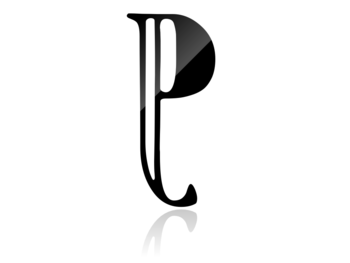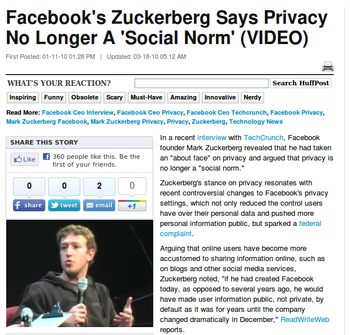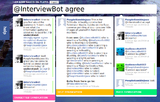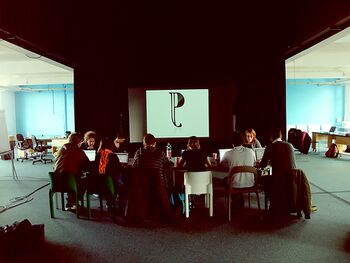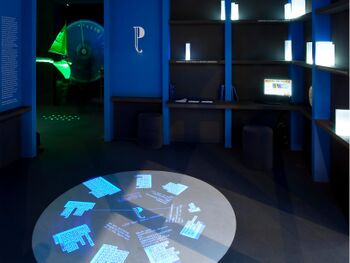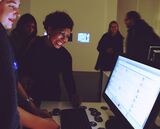Difference between revisions of "Naked on Pluto/Documentation"
m (Text replacement - "258px" to "350px") |
|||
| (18 intermediate revisions by 2 users not shown) | |||
| Line 1: | Line 1: | ||
{{Naked on Pluto}} | {{Naked on Pluto}} | ||
| − | [[Image:Griffiths Mansoux de Valk 2010 Naked on Pluto.png|thumb| | + | [[Image:Griffiths Mansoux de Valk 2010 Naked on Pluto.png|thumb|350px]] |
| − | [[Image:Griffiths_Mansoux_de_Valk_2012_Naked_on_Pluto website.png|thumb| | + | [[Image:Griffiths_Mansoux_de_Valk_2012_Naked_on_Pluto website.png|thumb|350px|Naked on Pluto website, 2012.<ref>[http://web.archive.org/web/20160313091852/http://naked-on-pluto.net/ Project's website] (archived).</ref>]] |
''Naked on Pluto'' by [[Dave Griffiths]], [[Aymeric Mansoux]] and [[Marloes de Valk]] proposes a fun yet disturbing online game world, developed with open source software, that parodies the insidiously invasive traits of much social media. The city of “Elastic Versailles” is animated by the quirky combinatorial logics of a community of artificial intelligence bots that glean the Facebook data of participants in the game. The bot crew, dispersed across ''Naked on Pluto''’s text-based environment, represents dysfunctional yet adamant gatekeepers. Players may try to override the game's access control and team up to crash and escape the system. | ''Naked on Pluto'' by [[Dave Griffiths]], [[Aymeric Mansoux]] and [[Marloes de Valk]] proposes a fun yet disturbing online game world, developed with open source software, that parodies the insidiously invasive traits of much social media. The city of “Elastic Versailles” is animated by the quirky combinatorial logics of a community of artificial intelligence bots that glean the Facebook data of participants in the game. The bot crew, dispersed across ''Naked on Pluto''’s text-based environment, represents dysfunctional yet adamant gatekeepers. Players may try to override the game's access control and team up to crash and escape the system. | ||
| Line 11: | Line 11: | ||
''Naked on Pluto'' caricatures the proliferation of virtual agents harvesting personal data and insidiously reframing online social environments and profiles. The work highlights the euphemisms of social networks: friends as quantifiable assets and carefully crafted personas imparting a sense of “intimacy”, and disingenuous publication of “private” data as self-advertising. Intelligence in this game emerges, ultimately, with players managing to escape from it. | ''Naked on Pluto'' caricatures the proliferation of virtual agents harvesting personal data and insidiously reframing online social environments and profiles. The work highlights the euphemisms of social networks: friends as quantifiable assets and carefully crafted personas imparting a sense of “intimacy”, and disingenuous publication of “private” data as self-advertising. Intelligence in this game emerges, ultimately, with players managing to escape from it. | ||
| − | January 2012<ref> | + | ''Based on artists' statement, January 2012''<ref>[https://www.cccb.org/en/participants/file/naked-on-pluto/40210 Statement on the website of CCCB, Barcelona], 16 January 2012.</ref> |
''For expanded statements see the [[#Essays|artists' essays and interviews]].'' | ''For expanded statements see the [[#Essays|artists' essays and interviews]].'' | ||
| Line 27: | Line 27: | ||
==Historical context== | ==Historical context== | ||
| − | [[Image:Zynga_Facebook_games_2010.jpg|thumb| | + | [[Image:Zynga_Facebook_games_2010.jpg|thumb|350px|Examples of Facebook games by Zynga]] |
Leakages of personal data from social media platforms began capturing public attention around 2010. It was revealed that Facebook allows third party app companies - notably Farmville-creator Zynga - to access private user information and re-distribute it to advertisers and tracking companies. | Leakages of personal data from social media platforms began capturing public attention around 2010. It was revealed that Facebook allows third party app companies - notably Farmville-creator Zynga - to access private user information and re-distribute it to advertisers and tracking companies. | ||
| − | [[Image:Facebook privacy 2010.png|thumb| | + | [[Image:Facebook privacy 2010.png|thumb|350px]] |
This and many revelations that followed contributed to alienating especially young people from the platform. However most users felt unaffected, since the implications of data privacy breaches seemed too abstract. Convinced about the beneficial social effects of his company, Facebook's chief executive Mark Zuckerberg continued to assert that in a democratic society one has nothing to hide: "more transparency should make for a more tolerant society in which people eventually accept that everybody sometimes does bad or embarrassing things",<ref>Michiko Kakutani, [https://www.nytimes.com/2010/06/08/books/08book.html "Company on the Verge of a Social Breakthrough"], ''New York Times'', 7 June 2010.</ref> or, more bluntly, that privacy is no longer a "social norm".<ref>[https://www.huffpost.com/entry/facebooks-zuckerberg-the_n_417969 "Facebook’s Zuckerberg Says Privacy No Longer A ‘Social Norm’ (VIDEO)"], ''HuffPost'', 18 March 2010.</ref> | This and many revelations that followed contributed to alienating especially young people from the platform. However most users felt unaffected, since the implications of data privacy breaches seemed too abstract. Convinced about the beneficial social effects of his company, Facebook's chief executive Mark Zuckerberg continued to assert that in a democratic society one has nothing to hide: "more transparency should make for a more tolerant society in which people eventually accept that everybody sometimes does bad or embarrassing things",<ref>Michiko Kakutani, [https://www.nytimes.com/2010/06/08/books/08book.html "Company on the Verge of a Social Breakthrough"], ''New York Times'', 7 June 2010.</ref> or, more bluntly, that privacy is no longer a "social norm".<ref>[https://www.huffpost.com/entry/facebooks-zuckerberg-the_n_417969 "Facebook’s Zuckerberg Says Privacy No Longer A ‘Social Norm’ (VIDEO)"], ''HuffPost'', 18 March 2010.</ref> | ||
| Line 43: | Line 43: | ||
===Game (software)=== | ===Game (software)=== | ||
| − | [[Image:Griffiths Mansoux de Valk 2010 Naked on Pluto client-server.png|thumb| | + | [[Image:Griffiths Mansoux de Valk 2010 Naked on Pluto client-server.png|thumb|350px|What does the game do with participants' data.<ref>[https://archive.bleu255.com/nakedonpluto/2010/11/16/what-do-w-do-with-your-data/ "What do we do with your data?"], ''Naked on Pluto'', 16 November 2010.</ref>]] |
| − | [[File:Griffiths_Mansoux_de_Valk_2011_Naked_on_Pluto_bots.mp4|thumb| | + | [[File:Griffiths_Mansoux_de_Valk_2011_Naked_on_Pluto_bots.mp4|thumb|350px|Cleaners, adbots, spybots and other bots in the ''Naked on Pluto'' world.<ref>Dave Griffiths, [https://vimeo.com/26612450 Vimeo].</ref>]] |
| − | The heart of ''Naked on Pluto'' was as an online game for Facebook users developed by the artists | + | The heart of ''Naked on Pluto'' was as an online game for Facebook users developed by the artists. Rather than subject to software versioning, it had been continuously developed, and in retrospect, several milestones may be considered. First, there were small changes in the application (such as the introduction of help menu and autocompletion) and bugs corrected. Later, more significant alterations were introduced. One of the new elements in the game, a cleaner bot, went public on [https://twitter.com/NopCleanerBot Twitter]. Also, the [http://web.archive.org/web/20160313091852/http://naked-on-pluto.net/ project's website] was redesigned as a news site featuring interviews with players conducted by a bot. Finally, the artists created several separate apps for exhibitions and workshops. One was responsible for realtime visualisation of data from the game, another for generating books, and one for running experiments on user data. |
| + | |||
| + | The artists actively maintained the game until about 2013 and it continued to operate until 2015 when Facebook changed its API and stopped providing friends' data to external applications, a feature making the ''Naked on Pluto'' game unplayable.<ref>Josh Constine, [https://techcrunch.com/2015/04/28/facebook-api-shut-down/ "Facebook Is Shutting Down Its API For Giving Your Friends’ Data To Apps"], ''TechCrunch'', 28 April 2015.</ref> This move effectively consolidated Facebook's monopoly over unchecked data extraction from its social graph and drove its third party ecosystem out of business. | ||
''Technical notes''. The game server was programmed in Racket, derived from Scheme, and the client-side was written in Javascript. The game used Facebook Connect and requested players for permission to access their their Facebook data and activity. This included identity information (name, profile picture, gender, networks, user ID, list of friends, and any other information shared with everyone), profile information (likes, music, TV, movies, books, quotes, ‘about me’ details, activities, interests, groups, events, notes, birthday, home town, current city, website, religious and political views, education history, work history and Facebook status), photos and videos (photos uploaded, videos uploaded and photos and videos of the user), friends’ information (birthdays, religious and political views, home towns, current cities, likes, music, TV, movies, books, quotes, activities, interests, education history, work history, websites, groups, events, notes, photos, videos, photos and videos of them, ‘about me’ details and Facebook statuses) and posts in a users’ news feed.<ref>[https://monoskop.org/images/a/a1/Naked_on_Pluto_2011_Funware.pdf#page=5 Griffiths et al 2011, 236].</ref> The game software is archived in a [https://gitlab.com/naked-on-pluto git repository].<ref>See esp. folders Game Broadcast, Game Client, Game Server, Slub Game Client, Slub Game Server.</ref> See also the artists' blog: [https://archive.bleu255.com/nakedonpluto/2010/06/27/web-games-tech-for-beginners/] [https://archive.bleu255.com/nakedonpluto/2010/08/14/development-master-plan/] [https://archive.bleu255.com/nakedonpluto/2010/11/16/what-do-w-do-with-your-data/] [https://archive.bleu255.com/nakedonpluto/2010/06/15/plutonian-clothing-strategy/]. | ''Technical notes''. The game server was programmed in Racket, derived from Scheme, and the client-side was written in Javascript. The game used Facebook Connect and requested players for permission to access their their Facebook data and activity. This included identity information (name, profile picture, gender, networks, user ID, list of friends, and any other information shared with everyone), profile information (likes, music, TV, movies, books, quotes, ‘about me’ details, activities, interests, groups, events, notes, birthday, home town, current city, website, religious and political views, education history, work history and Facebook status), photos and videos (photos uploaded, videos uploaded and photos and videos of the user), friends’ information (birthdays, religious and political views, home towns, current cities, likes, music, TV, movies, books, quotes, activities, interests, education history, work history, websites, groups, events, notes, photos, videos, photos and videos of them, ‘about me’ details and Facebook statuses) and posts in a users’ news feed.<ref>[https://monoskop.org/images/a/a1/Naked_on_Pluto_2011_Funware.pdf#page=5 Griffiths et al 2011, 236].</ref> The game software is archived in a [https://gitlab.com/naked-on-pluto git repository].<ref>See esp. folders Game Broadcast, Game Client, Game Server, Slub Game Client, Slub Game Server.</ref> See also the artists' blog: [https://archive.bleu255.com/nakedonpluto/2010/06/27/web-games-tech-for-beginners/] [https://archive.bleu255.com/nakedonpluto/2010/08/14/development-master-plan/] [https://archive.bleu255.com/nakedonpluto/2010/11/16/what-do-w-do-with-your-data/] [https://archive.bleu255.com/nakedonpluto/2010/06/15/plutonian-clothing-strategy/]. | ||
| Line 68: | Line 70: | ||
; Workshops | ; Workshops | ||
| − | [[Image:Griffiths_Mansoux_de_Valk_2012_Naked_on_Pluto_workshop Baltan Laboratories Eindhoven.jpg|thumb| | + | [[Image:Griffiths_Mansoux_de_Valk_2012_Naked_on_Pluto_workshop Baltan Laboratories Eindhoven.jpg|thumb|350px|''Naked on Pluto'' workshop at Baltan Laboratories, Eindhoven, May 2012.]] |
* Our Life Online, workshop and debate, CCCB, Barcelona, 24 February 2012. Facilitated by Aymeric Mansoux and Gerald Kogler; featuring a discussion with Jussi Parikka, Pau Waelder and Mónica Bello. [http://www.cccb.org/en/activities/file/i-c-i-our-life-online/217846 Announcement]. [https://archive.bleu255.com/nakedonpluto/2012/02/17/our-life-online-workshopdebate-24-february-2012-at-cccb/ Announcement]. [https://gitlab.com/naked-on-pluto/documentation/-/tree/master/tm Slides]. [http://www.cccb.org/en/multimedia/playlists/i-c-i-our-life-online/rel-event/217846 Videos]. [https://www.youtube.com/watch?v=CiaAFfFn06o Video report] (by Agora News). | * Our Life Online, workshop and debate, CCCB, Barcelona, 24 February 2012. Facilitated by Aymeric Mansoux and Gerald Kogler; featuring a discussion with Jussi Parikka, Pau Waelder and Mónica Bello. [http://www.cccb.org/en/activities/file/i-c-i-our-life-online/217846 Announcement]. [https://archive.bleu255.com/nakedonpluto/2012/02/17/our-life-online-workshopdebate-24-february-2012-at-cccb/ Announcement]. [https://gitlab.com/naked-on-pluto/documentation/-/tree/master/tm Slides]. [http://www.cccb.org/en/multimedia/playlists/i-c-i-our-life-online/rel-event/217846 Videos]. [https://www.youtube.com/watch?v=CiaAFfFn06o Video report] (by Agora News). | ||
| Line 76: | Line 78: | ||
; Presentations, lectures | ; Presentations, lectures | ||
| − | ''Plutonian Striptease'' was a lecture series organised by Marloes de Valk as part of ''Art Meets Radical Openness: Liwoli'' festival, Linz, 13-14 May 2011. The guest speakers presented a range of artistic projects related to social media, online privacy, data market and the economy of open systems: Marloes de Valk (Naked on Pluto), Owen Mundy (Give Me My Data), | + | ''Plutonian Striptease'' was a lecture series organised by Marloes de Valk as part of ''Art Meets Radical Openness: Liwoli'' festival, Linz, 13-14 May 2011. The guest speakers presented a range of artistic projects related to social media, online privacy, data market and the economy of open systems: [[Marloes de Valk]] (Naked on Pluto), Owen Mundy (Give Me My Data), [[Dušan Barok]] (FaceLeaks), [[Nicolas Malevé]] (Yoogle), Margaritha Köhl, Pippa Buchanan (Mozilla Webcraft), and [[Birgit Bachler]]. [https://archive.bleu255.com/nakedonpluto/2011/04/27/plutonian-striptease-lectures-at-liwoli-2011/ Announcement]. [https://radical-openness.org/en/program/2011/13.05. Program: part 1], [https://radical-openness.org/en/program/2011/14.05. part 2]. [https://webarchiv.servus.at/liwoli_amro/liwoli11/liwoli-videos/ Videos]. |
''Naked on Pluto'' was also presented by the artists at [http://nimk.nl/eng/search/space-invaders-event NIMk], Amsterdam, 12 October 2010; [http://old.usf.no/default.asp?side=program&art=5062 Piksel festival], Bergen, 20 November 2010; [https://archive.bleu255.com/nakedonpluto/2011/03/14/bof-constant-nop-public-lecture-at-piet-zwart-institute/ Piet Zwart Institute], Rotterdam, 16 March 2011; [http://www.isea-archives.org/symposia/isea2011/isea2011-presentations-2-2-2-2-2-2-2-2-3-3-2-2-2-2-2-2-2-2-2-2-2-2-2-2-2-2-2-2-2-2-2-2-2-2-2-2-2-2-2-2-2-2-2-2-2-2-2-3-2-2-2-2-2-2-2-2-2-2-2-2-2-2-2-2-2-2-2-2-2-2-2-2-2-2-2-2-2-2-2-2-2-2-2-2-2-2-2-582/ ISEA symposium], Istanbul, September 2011; [https://transmediale.de/content/isolation-and-empowerment-after-web-20 transmediale festival], Berlin, 3 February 2012 ([https://transmediale.de/content/presentation-aymeric-mansoux-isolation-and-empowerment-after-web-20-part-i-trapped-and-track video recording] and [https://gitlab.com/naked-on-pluto/documentation/-/tree/master/tm slides] are available). | ''Naked on Pluto'' was also presented by the artists at [http://nimk.nl/eng/search/space-invaders-event NIMk], Amsterdam, 12 October 2010; [http://old.usf.no/default.asp?side=program&art=5062 Piksel festival], Bergen, 20 November 2010; [https://archive.bleu255.com/nakedonpluto/2011/03/14/bof-constant-nop-public-lecture-at-piet-zwart-institute/ Piet Zwart Institute], Rotterdam, 16 March 2011; [http://www.isea-archives.org/symposia/isea2011/isea2011-presentations-2-2-2-2-2-2-2-2-3-3-2-2-2-2-2-2-2-2-2-2-2-2-2-2-2-2-2-2-2-2-2-2-2-2-2-2-2-2-2-2-2-2-2-2-2-2-2-3-2-2-2-2-2-2-2-2-2-2-2-2-2-2-2-2-2-2-2-2-2-2-2-2-2-2-2-2-2-2-2-2-2-2-2-2-2-2-2-582/ ISEA symposium], Istanbul, September 2011; [https://transmediale.de/content/isolation-and-empowerment-after-web-20 transmediale festival], Berlin, 3 February 2012 ([https://transmediale.de/content/presentation-aymeric-mansoux-isolation-and-empowerment-after-web-20-part-i-trapped-and-track video recording] and [https://gitlab.com/naked-on-pluto/documentation/-/tree/master/tm slides] are available). | ||
| Line 96: | Line 98: | ||
===Exhibitions=== | ===Exhibitions=== | ||
| − | [[Image:Griffiths_Mansoux_de_Valk_2012_Naked_on_Pluto_installation view_ARCO_Madrid.jpg|thumb| | + | [[Image:Griffiths_Mansoux_de_Valk_2012_Naked_on_Pluto_installation view_ARCO_Madrid.jpg|thumb|350px|''Naked on Pluto'' installation view, ARCO Madrid, 2012. {{a|books}}]] |
| − | [[Image: | + | [[Image:Naked_on_Pluto_MarketingBot_2012.png|thumb|300px|link=https://monoskop.org/images/2/24/Naked_on_Pluto_MarketingBot_2012.pdf|One of the ''Naked on Pluto'' books presented as part of installations. [[Media:Naked_on_Pluto_MarketingBot_2012.pdf|PDF version]].]] |
| − | [ | + | In October 2011, Naked on Pluto was awarded with the VIDA (Art and Artificial Life International Awards) 13.2. prize<ref>[https://vida.fundaciontelefonica.com/en/projects/vida-13-2/ VIDA 13.2], 2011</ref> and exhibited at ARCO 2012 in Madrid as part of the award exhibition there. The project was also shown at [[MU|MU Eindhoven]] (NL), FILE São Paulo (BR), FILE RIO (BR), [[FACT|FACT Liverpool]] (UK), [[Kibla|KIBLA Maribor]] (SI), and the National Taiwan Museum of Fine Arts Taipei (TW). |
| − | + | ; Installation | |
| − | |||
| − | |||
| − | + | When the project started to be exhibited, the artists agreed that simply showing the website was not interesting (see wiki to traces of discussions about that matter). They wanted to avoid making "an exhibition of documentation" and explored ways to translate the work to the exhibition space. | |
| − | + | The artists chose the central point of the Naked on Pluto's world, the Plutonian Library, as the centrepiece of the work's installation as well. The library was a final location in the game that needed to be DDOS'ed by the player in order to escape the social media dystopia world they had been jailed in. The library was essentially a metaphor for centralised social network databases. Here, everything was tracked, recorded and controlled. | |
| − | The | + | The installation was intended as a presentation of the activity in the game, illustrating that every single thing in it is being tracked and recorded. The activity of players and bots was presented in a real-time visualisation. For each exhibition, the artists also produced thirty unique books, intended as physical manifestation of the library. Each represented the whole history of an object, a bot or a player in the game. This was possible by recording the state/graph of the game world on the server side throughout the operation of the game. Besides these elements, computer terminal and wifi were provided to access the game. |
; Exhibition history | ; Exhibition history | ||
| Line 120: | Line 120: | ||
* ''Funware'' exhibition, MU, Eindhoven, opened 12 November 2011. [https://archive.bleu255.com/nakedonpluto/2010/11/11/nop-funware-exhibition/ Announcement]. [https://kiwi.bleu255.com/Exhibition_NOP#Exhibition_at_MU Technical notes]. [https://archive.bleu255.com/nakedonpluto/2010/11/16/opening-funware-exhibition/ Photo documentation from opening]. | * ''Funware'' exhibition, MU, Eindhoven, opened 12 November 2011. [https://archive.bleu255.com/nakedonpluto/2010/11/11/nop-funware-exhibition/ Announcement]. [https://kiwi.bleu255.com/Exhibition_NOP#Exhibition_at_MU Technical notes]. [https://archive.bleu255.com/nakedonpluto/2010/11/16/opening-funware-exhibition/ Photo documentation from opening]. | ||
| − | * ARCO, Madrid, February 2012. [https://archive.bleu255.com/nakedonpluto/files/2012/01/rect7086.png Installation model]. [https://archive.bleu255.com/nakedonpluto/2012/02/15/setting-up-naked-on-pluto-at-arco/ Photos from installation process]. [https://www.flickr.com/photos/dave-griffiths/sets/72157629300248677/ Photo documentation of installation], [https://archive.bleu255.com/nakedonpluto/2012/03/02/photos-from-the-naked-on-pluto-installation-at-arco/]. [http://www.pawfal.org/dave/blog/2012/02/naked-on-plutovida-at-arco2012-madrid/ Report from installation process by Dave Griffiths]. | + | * ARCO, Madrid, February 2012. [https://archive.bleu255.com/nakedonpluto/files/2012/01/rect7086.png Installation model]. [https://archive.bleu255.com/nakedonpluto/2012/02/15/setting-up-naked-on-pluto-at-arco/ Photos from installation process]. [https://www.flickr.com/photos/dave-griffiths/sets/72157629300248677/ Photo documentation of installation], [https://archive.bleu255.com/nakedonpluto/2012/03/02/photos-from-the-naked-on-pluto-installation-at-arco/ (cont.)]. [http://www.pawfal.org/dave/blog/2012/02/naked-on-plutovida-at-arco2012-madrid/ Report from installation process by Dave Griffiths]. |
* ''Robots and Avatars'' exhibition, FACT, Liverpool, 16 March - 27 May 2012. [http://www.robotsandavatars.net/exhibition/robotsandavatars_fact/ Exhibition website]. [https://www.fact.co.uk/artwork/naked-on-pluto-2010 Artwork page]. | * ''Robots and Avatars'' exhibition, FACT, Liverpool, 16 March - 27 May 2012. [http://www.robotsandavatars.net/exhibition/robotsandavatars_fact/ Exhibition website]. [https://www.fact.co.uk/artwork/naked-on-pluto-2010 Artwork page]. | ||
| Line 129: | Line 129: | ||
* ''Super-Connect–2013 International Techno Art Exhibition'', Taiwan, 10 August - 27 October 2013. [https://archive.bleu255.com/nakedonpluto/2013/09/23/naked-on-pluto-in-taiwan/ Announcement]. [http://web.archive.org/web/20160325064542/http://www.ntmofa.gov.tw/english/ShowInfomation2_1.aspx?SN=3888 Exhibition website] (archived). [https://www.e-flux.com/announcements/32323/tea-super-connect-2013-international-techno-art-exhibition/ Announcement]. [https://artradarjournal.com/2013/11/01/science-technology-and-visual-art-artists-in-a-hybrid-world/ Exh. review by Kate Nicholson, Art Radar]. | * ''Super-Connect–2013 International Techno Art Exhibition'', Taiwan, 10 August - 27 October 2013. [https://archive.bleu255.com/nakedonpluto/2013/09/23/naked-on-pluto-in-taiwan/ Announcement]. [http://web.archive.org/web/20160325064542/http://www.ntmofa.gov.tw/english/ShowInfomation2_1.aspx?SN=3888 Exhibition website] (archived). [https://www.e-flux.com/announcements/32323/tea-super-connect-2013-international-techno-art-exhibition/ Announcement]. [https://artradarjournal.com/2013/11/01/science-technology-and-visual-art-artists-in-a-hybrid-world/ Exh. review by Kate Nicholson, Art Radar]. | ||
| + | |||
| + | <gallery> | ||
| + | Griffiths_Mansoux_de_Valk_2012_Naked_on_Pluto_data_visualisation_ARCO_Madrid.png|''Naked on Pluto'' data visualisation, ARCO Madrid, 2012. | ||
| + | Griffiths_Mansoux_de_Valk_2012_Naked_on_Pluto_data_visualisation_ARCO_Madrid.jpg|Visitors interacting with ''Naked on Pluto'' data visualisation, ARCO Madrid, 2012. | ||
| + | Griffiths_Mansoux_de_Valk_2011_Naked_on_Pluto_Funware opening MU Eindhoven.jpg|Visitors interacting with ''Naked on Pluto'' game, Funware opening, MU, Eindhoven, November 2011. | ||
| + | </gallery> | ||
===Publishing research and development=== | ===Publishing research and development=== | ||
| − | Publishing had an important role and served different | + | Publishing had an important role and served different roles, from making public the current state of the research to the use of publishing as an artistic medium in itself. Central to this was a research blog started early on and used to announce milestones, events, but also share snippets of code, various musings about the topic and interviews with peers and scholars. Less visible was the project's wiki that was used for drafting internal documents, dumping ideas and project planning and management. When the game was moreless finalised, the interactions between bots and players became source material to generate and publish content outside of the game. This took the form of a blog, a Twitter bot, and a series of printed books for exhibitions. |
; Plutonian Striptease | ; Plutonian Striptease | ||
| − | + | In order to map a range of perspectives on social networks and data privacy, between September 2010 and January 2011, the artists conduced interviews with twelve "experts, owners, users, fans and haters of social media". Next to providing a snapshot of social media critique at the time, these interviews also served as an impetus for developing new or re-enforcing existing narrative elements in the game. The interviews were released on the [https://archive.bleu255.com/nakedonpluto/category/interview/ project's blog] and [https://monoskop.org/images/a/a1/Naked_on_Pluto_2011_Funware.pdf#page=6 a mashup] was published by Baltan Laboratories in ''A Blueprint for a Lab of the Future'' (2011). | |
''Published interviews'' (September 2010-January 2011): | ''Published interviews'' (September 2010-January 2011): | ||
| Line 156: | Line 162: | ||
; Blog | ; Blog | ||
| − | The blog was divided into | + | The blog was divided into eight categories reflecting different aspects of the research: contextual, graphic design, installation, interface design, interview, script writing, technical, and workshop. Each post was further described with tags. The most used were: privacy, social networks, web 2.0, EULA, Internet, exhibition, VIDA, Facebook, data mining and marketing. |
A static archive of the blog can be found at https://archive.bleu255.com/nakedonpluto/ | A static archive of the blog can be found at https://archive.bleu255.com/nakedonpluto/ | ||
| Line 162: | Line 168: | ||
; Wiki | ; Wiki | ||
| − | + | An instance of MediaWiki was used to dump ideas, draft documents and share materials. It was roughly organised but with little intent to make it particularly useful for public audience. Since the artists use the wiki for their other projects and occupations as well, the pages related to the project were put in the [https://kiwi.bleu255.com/Category:Naked_on_Pluto category "Naked on Pluto"]. | |
''Selected pages of interest'': | ''Selected pages of interest'': | ||
| Line 215: | Line 221: | ||
==Credits== | ==Credits== | ||
| − | ''Naked on Pluto'' was | + | ''Naked on Pluto'' was created by [[Dave Griffiths]], [[Aymeric Mansoux]] and [[Marloes de Valk]] with support from [[NIMk]] (now [[LIMA]]). Major part of the work was developed through sprints as part of the [[Funware]] residency (2010) at [[NIMk]],<ref>NIMk, [http://www.nimk.nl/eng/naked-on-pluto Artist in Residence: Naked on Pluto], 2010.</ref> [[Baltan Laboratories]]<ref>[https://www.baltanlaboratories.org/library/funware-residency "Funware residency: Naked on Pluto"], ''Baltan Laboratories'', 7 July 2010.</ref> and [[Piksel]].<ref>[https://piksel.no/2010/07/15/funware-residency-naked-on-pluto-by-dave-griffiths-aymeric-mansoux-and-marloes-de-valk "Funware Residency: Naked on Pluto by Dave Griffiths, Aymeric Mansoux and Marloes de Valk"], ''Piksel'', 15 July 2010.</ref> The Facesponge workshop (2011) was supported by AVEK and [[Baltan Laboratories]]. Web hosting was provided by [[servus.at]]. |
| − | Contributors | + | Contributors: ''interviews'': Rob Myers, [[Dmytri Kleiner]], [[Geoff Cox]], [[Rob van Kranenburg]], [[Geert Lovink]], [[Marc Garrett]], [[Florian Cramer]], Owen Mundy, [[Constant]], [[Mez Breeze]], [[Gordan Savičić]]; ''feedback on sprints'': [[Annet Dekker]], Angela Plohman; ''exhibition architecture and production'': VIDA team. Testing and game feedback: Kassen Oud, [[Alex McLean]], [[Michael Murtaugh]], game design students and researchers from TU Eindhoven. |
The project's content is available under copyleft licenses (GPL, CC-BY-SA, FAL, depending on the material). | The project's content is available under copyleft licenses (GPL, CC-BY-SA, FAL, depending on the material). | ||
| − | This documentation and accompanied presentation and archive were assembled by [[Dušan Barok]] and [[Julie Boschat Thorez]] in collaboration with [[Aymeric Mansoux]] as part of | + | This documentation and accompanied presentation and archive were assembled by [[Dušan Barok]] and [[Julie Boschat Thorez]] in collaboration with [[Aymeric Mansoux]], supported by [[LIMA]] as part of its programme [https://www.li-ma.nl/lima/news/documentation-digital-art Documentation of Digital Art] in January-June 2020. The process was discussed in an [https://www.li-ma.nl/lima/sites/default/files/nakedonpluto_workshop.pdf online workshop] on 30 June 2020. Mila van der Weide wrote a [https://www.li-ma.nl/lima/sites/default/files/4%20Summary%20Workshop%20Documenting%20Digital%20Art_30.06.2020_NoP.pdf workshop summary]. |
==References== | ==References== | ||
Latest revision as of 22:59, 25 May 2022
| Naked on Pluto, 2010-2015 – Marloes de Valk, Aymeric Mansoux, Dave Griffiths | ||
|---|---|---|
|
Work – Documentation – Archive – Preservation | ||
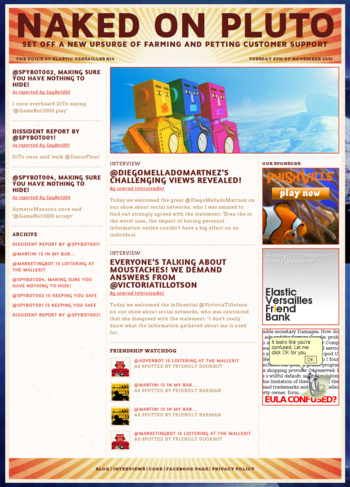
Naked on Pluto by Dave Griffiths, Aymeric Mansoux and Marloes de Valk proposes a fun yet disturbing online game world, developed with open source software, that parodies the insidiously invasive traits of much social media. The city of “Elastic Versailles” is animated by the quirky combinatorial logics of a community of artificial intelligence bots that glean the Facebook data of participants in the game. The bot crew, dispersed across Naked on Pluto’s text-based environment, represents dysfunctional yet adamant gatekeepers. Players may try to override the game's access control and team up to crash and escape the system.
Robots generate a constant stream of stimuli to respond, click, poke and buy, while running havoc with users' and their contacts' data, leaking also outside the game world. Disconcertingly familiar moments and traces from one’s own and associated profiles are mixed indiscriminately in a brash landscape, reminiscent of the original Versailles. However, in this malleable ecosystem where all that counts are glimpses of fleeting visibility, no personal information is actually stored, nor is it relayed to Facebook.
Naked on Pluto caricatures the proliferation of virtual agents harvesting personal data and insidiously reframing online social environments and profiles. The work highlights the euphemisms of social networks: friends as quantifiable assets and carefully crafted personas imparting a sense of “intimacy”, and disingenuous publication of “private” data as self-advertising. Intelligence in this game emerges, ultimately, with players managing to escape from it.
Based on artists' statement, January 2012[2]
For expanded statements see the artists' essays and interviews.
Artists' video presentation of Naked on Pluto, September 2011.[3]
Contents
Introduction[edit]
The documentation assembled on this website is part of an initiative to preserve the work Naked on Pluto. It is accompanied by the work's presentation and archive. Detailed description of the approach can be found on a dedicated page.
Historical context[edit]
Leakages of personal data from social media platforms began capturing public attention around 2010. It was revealed that Facebook allows third party app companies - notably Farmville-creator Zynga - to access private user information and re-distribute it to advertisers and tracking companies.
This and many revelations that followed contributed to alienating especially young people from the platform. However most users felt unaffected, since the implications of data privacy breaches seemed too abstract. Convinced about the beneficial social effects of his company, Facebook's chief executive Mark Zuckerberg continued to assert that in a democratic society one has nothing to hide: "more transparency should make for a more tolerant society in which people eventually accept that everybody sometimes does bad or embarrassing things",[4] or, more bluntly, that privacy is no longer a "social norm".[5]
Edward Snowden's disclosures about the mass scale of systemic surveillance by state information agencies came several years later, in 2013. They included details on how personal data extracted from social media, especially a person's social graph, are key for chaining private contacts and enhancing the analysis of personal communication.
The Cambridge Analytica scandal in 2018 has shown that personal data from social media is valuable not only for commercial advertising and state security but also for running digital election campaings and targeting voters.
The work[edit]
Game (software)[edit]

The heart of Naked on Pluto was as an online game for Facebook users developed by the artists. Rather than subject to software versioning, it had been continuously developed, and in retrospect, several milestones may be considered. First, there were small changes in the application (such as the introduction of help menu and autocompletion) and bugs corrected. Later, more significant alterations were introduced. One of the new elements in the game, a cleaner bot, went public on Twitter. Also, the project's website was redesigned as a news site featuring interviews with players conducted by a bot. Finally, the artists created several separate apps for exhibitions and workshops. One was responsible for realtime visualisation of data from the game, another for generating books, and one for running experiments on user data.
The artists actively maintained the game until about 2013 and it continued to operate until 2015 when Facebook changed its API and stopped providing friends' data to external applications, a feature making the Naked on Pluto game unplayable.[8] This move effectively consolidated Facebook's monopoly over unchecked data extraction from its social graph and drove its third party ecosystem out of business.
Technical notes. The game server was programmed in Racket, derived from Scheme, and the client-side was written in Javascript. The game used Facebook Connect and requested players for permission to access their their Facebook data and activity. This included identity information (name, profile picture, gender, networks, user ID, list of friends, and any other information shared with everyone), profile information (likes, music, TV, movies, books, quotes, ‘about me’ details, activities, interests, groups, events, notes, birthday, home town, current city, website, religious and political views, education history, work history and Facebook status), photos and videos (photos uploaded, videos uploaded and photos and videos of the user), friends’ information (birthdays, religious and political views, home towns, current cities, likes, music, TV, movies, books, quotes, activities, interests, education history, work history, websites, groups, events, notes, photos, videos, photos and videos of them, ‘about me’ details and Facebook statuses) and posts in a users’ news feed.[9] The game software is archived in a git repository.[10] See also the artists' blog: [1] [2] [3] [4].
Workshops, presentations, essays, interviews[edit]
In their presentations, workshops, essays and interviews, the artists drew from their research surrounding Naked on Pluto's development and accommodated discussion with different audiences. These formats allowed thorough contextualisation, expanded the referential framework and revealed the technical aspects of Facebook's application hazards (uncovered during the game's development). Presentations were adapted to audience and thematic events in which they took place, and reflected the state of advancement of the project. The Liwoli lecture series, for example, brought more voices into the conversation. The workshops, held in the latter phase of the work's life, featured hands-on exploration of the Facebook API, using the web application Facesponge developed by the artists as a sandbox for live-code manipulation of Facebook user data. Although the format was very enriching for the project, only two workshops were held, mainly due to the lack of interest in social media critique at the time. These moments also allowed to channel the discussion to some very different audiences: while the workshop in Barcelona brought together people from different horizons and of various ages, the one in Eindhoven had a very young audience with more social media literacy, but more reluctant to critique.
Publications formed another discursive element of the work. The essay published in the ISEA proceedings and in the Sniff, Scape, Crawl publication operates as a self-standing paper, while the section in the Baltan Laboratories book presents research material alongside an interview with the artists. Another two interviews, featured in Libération and on the Fundación Telefónica website, address general audience.
- Workshops
- Our Life Online, workshop and debate, CCCB, Barcelona, 24 February 2012. Facilitated by Aymeric Mansoux and Gerald Kogler; featuring a discussion with Jussi Parikka, Pau Waelder and Mónica Bello. Announcement. Announcement. Slides. Videos. Video report (by Agora News).
- FaceSponge workshop and presentation, Baltan Laboratories, Eindhoven, May 2012. Workshop structure and notes. Slides. Report by the artists. Report by Dave Griffiths. Photo documentation.
- Presentations, lectures
Plutonian Striptease was a lecture series organised by Marloes de Valk as part of Art Meets Radical Openness: Liwoli festival, Linz, 13-14 May 2011. The guest speakers presented a range of artistic projects related to social media, online privacy, data market and the economy of open systems: Marloes de Valk (Naked on Pluto), Owen Mundy (Give Me My Data), Dušan Barok (FaceLeaks), Nicolas Malevé (Yoogle), Margaritha Köhl, Pippa Buchanan (Mozilla Webcraft), and Birgit Bachler. Announcement. Program: part 1, part 2. Videos.
Naked on Pluto was also presented by the artists at NIMk, Amsterdam, 12 October 2010; Piksel festival, Bergen, 20 November 2010; Piet Zwart Institute, Rotterdam, 16 March 2011; ISEA symposium, Istanbul, September 2011; transmediale festival, Berlin, 3 February 2012 (video recording and slides are available).
- Essays
- Griffiths, David, Aymeric Mansoux, and Marloes de Valk, "Naked on Pluto: Share Your Way to a Better World", in A Blueprint for a Lab of the Future, ed. Angela Plohman, Eindhoven: Baltan Laboratories, 2011, 232-237. Part of the project's feature in a book from Naked on Pluto residency co-host. [5] [6]
- de Valk, Marloes, "Naked on Pluto", in ISEA2011, the 17th International Symposium on Electronic Art, Istanbul: ISEA, 2011, 605-610; repr. in Sniff, Scape, Crawl: On Privacy, Surveillance and Our Shadowy Data-Double, ed. Renée Turner, London: Openmute, and Rotterdam: Piet Zwart Institute, 2012. Based on symposium presentation.
- Interviews
- Lechner, Marie, "Facebook mis à nu", Libération, 17 Jan 2011. (French)
- Dekker, Annet, Angela Plohman, and Irma Földényi, "Interview with Dave Griffiths, Aymeric Mansoux & Marloes de Valk", in A Blueprint for a Lab of the Future, ed. Angela Plohman, Eindhoven: Baltan Laboratories, 2011, 248-256.
- Waelder, Pau, "Software Is the Artwork: Interview with Aymeric Mansoux, Marloes de Valk and Dave Griffiths", Vida, Madrid: Fundación Telefónica, 23 Jan 2014. Conducted on the occassion of receiving the First Prize at VIDA 13.2 awards for Naked on Pluto.
Exhibitions[edit]
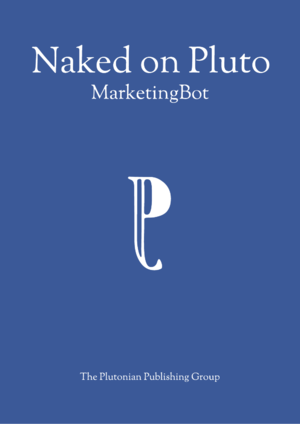
In October 2011, Naked on Pluto was awarded with the VIDA (Art and Artificial Life International Awards) 13.2. prize[11] and exhibited at ARCO 2012 in Madrid as part of the award exhibition there. The project was also shown at MU Eindhoven (NL), FILE São Paulo (BR), FILE RIO (BR), FACT Liverpool (UK), KIBLA Maribor (SI), and the National Taiwan Museum of Fine Arts Taipei (TW).
- Installation
When the project started to be exhibited, the artists agreed that simply showing the website was not interesting (see wiki to traces of discussions about that matter). They wanted to avoid making "an exhibition of documentation" and explored ways to translate the work to the exhibition space.
The artists chose the central point of the Naked on Pluto's world, the Plutonian Library, as the centrepiece of the work's installation as well. The library was a final location in the game that needed to be DDOS'ed by the player in order to escape the social media dystopia world they had been jailed in. The library was essentially a metaphor for centralised social network databases. Here, everything was tracked, recorded and controlled.
The installation was intended as a presentation of the activity in the game, illustrating that every single thing in it is being tracked and recorded. The activity of players and bots was presented in a real-time visualisation. For each exhibition, the artists also produced thirty unique books, intended as physical manifestation of the library. Each represented the whole history of an object, a bot or a player in the game. This was possible by recording the state/graph of the game world on the server side throughout the operation of the game. Besides these elements, computer terminal and wifi were provided to access the game.
- Exhibition history
- Speed Show vol.5: Open Internet, Paris, 13 January 2011. Announcement.
- FILE festival, SESI Cultural Centre, São Paulo, 18 July - 21 August 2011. Announcement.
- Funware exhibition, MU, Eindhoven, opened 12 November 2011. Announcement. Technical notes. Photo documentation from opening.
- ARCO, Madrid, February 2012. Installation model. Photos from installation process. Photo documentation of installation, (cont.). Report from installation process by Dave Griffiths.
- Robots and Avatars exhibition, FACT, Liverpool, 16 March - 27 May 2012. Exhibition website. Artwork page.
- FILE festival, Oi Futuro Rua Dois de Dezembro, Rio de Janeiro, 10 April - 13 May 2012. Announcement. Exhibition website (archived).
- Robots and Avatars exhibition, KIBLA, Maribor, 5 - 30 October 2012. Exhibition website. Announcement. Announcement.
- Super-Connect–2013 International Techno Art Exhibition, Taiwan, 10 August - 27 October 2013. Announcement. Exhibition website (archived). Announcement. Exh. review by Kate Nicholson, Art Radar.
Publishing research and development[edit]
Publishing had an important role and served different roles, from making public the current state of the research to the use of publishing as an artistic medium in itself. Central to this was a research blog started early on and used to announce milestones, events, but also share snippets of code, various musings about the topic and interviews with peers and scholars. Less visible was the project's wiki that was used for drafting internal documents, dumping ideas and project planning and management. When the game was moreless finalised, the interactions between bots and players became source material to generate and publish content outside of the game. This took the form of a blog, a Twitter bot, and a series of printed books for exhibitions.
- Plutonian Striptease
In order to map a range of perspectives on social networks and data privacy, between September 2010 and January 2011, the artists conduced interviews with twelve "experts, owners, users, fans and haters of social media". Next to providing a snapshot of social media critique at the time, these interviews also served as an impetus for developing new or re-enforcing existing narrative elements in the game. The interviews were released on the project's blog and a mashup was published by Baltan Laboratories in A Blueprint for a Lab of the Future (2011).
Published interviews (September 2010-January 2011):
- Blog
The blog was divided into eight categories reflecting different aspects of the research: contextual, graphic design, installation, interface design, interview, script writing, technical, and workshop. Each post was further described with tags. The most used were: privacy, social networks, web 2.0, EULA, Internet, exhibition, VIDA, Facebook, data mining and marketing.
A static archive of the blog can be found at https://archive.bleu255.com/nakedonpluto/
- Wiki
An instance of MediaWiki was used to dump ideas, draft documents and share materials. It was roughly organised but with little intent to make it particularly useful for public audience. Since the artists use the wiki for their other projects and occupations as well, the pages related to the project were put in the category "Naked on Pluto".
Selected pages of interest:
- Early exhibition ideas
- Game slice (speculative gameplay) from when the game was though more like a live coding sandbox and less of an interactive fiction
- Early research topics that were considered
- Minutes from initial meetings
- Development how-to
- Workshops outline
- Early notes about the best way to deal with Facebook terms and what kind of data would be used
- Brief survey of mainstream social media critique in 2010
- Brief survey of existing relevant social media artworks in 2010
- Interview questions and interviewees
- Early ideas for interface
Archive[edit]
The project's archive inventory is available on a dedicated page on Monoskop wiki.
Reception[edit]
- Furtherfield, "DIWO: Do It With Others – No Ecology without Social Ecology", in Remediating the Social, ed. Simon Biggs, Edinburgh: University of Edinburgh, 2012.
- Dekker, Annet, et al., "Transnational, Collaborative Artists in Residency Programmes", Digimag 73, Nov 2012, 32-45.
- Graham, Beryl, "Introduction", in New Collecting: Exhibiting and Audiences after New Media Art, ed. Beryl Graham, Ashgate, 2014, 8-9, 14.
- Segura Domingo, Yolanda, "Hibridaciones en el net.art. Del hipermedia a la visualizacion de datos", Valencia: Universitat Politecnica de Valencia, Jul 2014. (Spanish)
- Dekker, Annet, "The Challenge of Open Source for Conservation", in Performing Documentation in the Conservation of Contemporary Art, eds. Lúcia Almeida Matos, Rita Macedo and Gunnar Heydenreich, Lisbon: Instituto de História da Arte, 2015, 124-132.
- Dekker, Annet, "Curating in Progress: Moving Between Objects and Processes", in Uncertain Spaces: Virtual Configurations in Contemporary Art and Museums, eds. Helena Barranha and Susana S. Martins, Lisbon: Universidade Nova de Lisboa, 2015, 40-43.
- Dekker, Annet, "Enabling the Future or How to Survive FOREVER", in A Companion to Digital Art, ed. Christiane Paul, Wiley Blackwell, 2016, 564-5, 579.
- Paul, Christiane, "Augmented Realities: Digital Art in the Public Sphere", in A Companion to Public Art, eds. Cher Krause Knight and Harriet F. Senie, Wiley-Blackwell, 2016, 331.
- Morelli, Pierre, "La viralité entre métaphore communicationnelle et approche esthétique", Madarat 29-30: "Dialogue des révolutions: la viralité", Spring 2017, 12. (French)
- Jaume Pérez, Borja, "Software libre como Arte Revolucionario Experimental: modelos de autómata en el certamen VIDA. Concurso Internacional Arte y Vida Artificial. 1999-2016", Madrid: Universidad Complutense Madrid, 2017, 24, 54-55. (Spanish)
- Fernández Zapata, Laura, "Ventana-pantalla: Paradojas de identidad, intimidad y afecto después de Internet", Barcelona: Universitat de Barcelona, 2018, 49-50. (Spanish)
- Dekker, Annet, "Following process and openness", ch. 4 in Dekker, Collecting and Conserving Net Art, London: Routledge, 2018.
- Luginbuhl, Chris, "Future Renaissance", Toronto: OCAD University, 2019, 10.
- Naked on Pluto is featured in the Interactive Fiction Database.
Credits[edit]
Naked on Pluto was created by Dave Griffiths, Aymeric Mansoux and Marloes de Valk with support from NIMk (now LIMA). Major part of the work was developed through sprints as part of the Funware residency (2010) at NIMk,[12] Baltan Laboratories[13] and Piksel.[14] The Facesponge workshop (2011) was supported by AVEK and Baltan Laboratories. Web hosting was provided by servus.at.
Contributors: interviews: Rob Myers, Dmytri Kleiner, Geoff Cox, Rob van Kranenburg, Geert Lovink, Marc Garrett, Florian Cramer, Owen Mundy, Constant, Mez Breeze, Gordan Savičić; feedback on sprints: Annet Dekker, Angela Plohman; exhibition architecture and production: VIDA team. Testing and game feedback: Kassen Oud, Alex McLean, Michael Murtaugh, game design students and researchers from TU Eindhoven.
The project's content is available under copyleft licenses (GPL, CC-BY-SA, FAL, depending on the material).
This documentation and accompanied presentation and archive were assembled by Dušan Barok and Julie Boschat Thorez in collaboration with Aymeric Mansoux, supported by LIMA as part of its programme Documentation of Digital Art in January-June 2020. The process was discussed in an online workshop on 30 June 2020. Mila van der Weide wrote a workshop summary.
References[edit]
- ↑ Project's website (archived).
- ↑ Statement on the website of CCCB, Barcelona, 16 January 2012.
- ↑ Youtube, 6 September 2011
- ↑ Michiko Kakutani, "Company on the Verge of a Social Breakthrough", New York Times, 7 June 2010.
- ↑ "Facebook’s Zuckerberg Says Privacy No Longer A ‘Social Norm’ (VIDEO)", HuffPost, 18 March 2010.
- ↑ "What do we do with your data?", Naked on Pluto, 16 November 2010.
- ↑ Dave Griffiths, Vimeo.
- ↑ Josh Constine, "Facebook Is Shutting Down Its API For Giving Your Friends’ Data To Apps", TechCrunch, 28 April 2015.
- ↑ Griffiths et al 2011, 236.
- ↑ See esp. folders Game Broadcast, Game Client, Game Server, Slub Game Client, Slub Game Server.
- ↑ VIDA 13.2, 2011
- ↑ NIMk, Artist in Residence: Naked on Pluto, 2010.
- ↑ "Funware residency: Naked on Pluto", Baltan Laboratories, 7 July 2010.
- ↑ "Funware Residency: Naked on Pluto by Dave Griffiths, Aymeric Mansoux and Marloes de Valk", Piksel, 15 July 2010.
| Naked on Pluto, 2010-2015 – Marloes de Valk, Aymeric Mansoux, Dave Griffiths | ||
|---|---|---|
|
Work – Documentation – Archive – Preservation | ||
